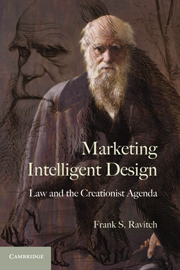Book contents
3 - The Law and Intelligent Design
Published online by Cambridge University Press: 05 June 2012
Summary
The Basics
Intelligent design (ID) raises a number of legal issues. The most obvious is whether it can be taught and/or supported in public school science classrooms or whether doing so violates the establishment clause of the First Amendment to the U.S. Constitution. A related issue is whether the inclusion of disclaimers regarding evolution in science classes or texts violates the establishment clause. Additionally, ID advocates have urged that schools should teach the so-called weaknesses in evolutionary theory and methodological naturalism generally – weaknesses that often only exist in the minds of ID advocates and creationists. Another approach urged by ID advocates is to “teach the controversy.” The supposed controversy is between naturalism, especially evolution through natural selection, and supernatural possibilities, including Big D.
Yet the legal debate over design does not end with these more obvious legal questions. Central to the ID movement's marketing strategy, and to its potential success on some of the issues mentioned earlier, is the notion that ID is being excluded from scientific fora that include not only classrooms but government funding and the scientific community more generally. Implicit in this argument is the notion that ID has a right to access these fora, and this raises two separate legal issues.
- Type
- Chapter
- Information
- Marketing Intelligent DesignLaw and the Creationist Agenda, pp. 61 - 108Publisher: Cambridge University PressPrint publication year: 2010



